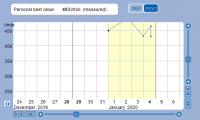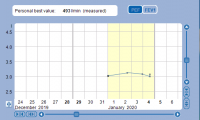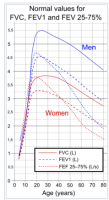I have recently developed increasing problems with breathing.
During the day it is not limiting.
However, in the mornings I have been awakening with headaches.
A visit to the doctor was not helpful.
In fact, the doctor seemed quite confused by my report:
I have never smoked,
I live in an environment with fresh air etc.,
I have never had lung issues over the last few decades.
Aside from the breathing issues, I feel quite healthy.
There isn't any obvious reason for what the problem might be.
I was given a prescription of Pulmicort and was sent on my way.
The Pulmicort did not seem to be overly helpful; I used it a few times and then
gave up on it.
I recently received an electronic breathing measurement device.
Not surprisingly my PEV values are well below normal.
I should be exhaling at 570, but my values have been 450-500.
Inhaling is not particularly difficult, it is more on the exhale that my outbreath
seems to just stop.
I am very unsure what this might be.
I thought that perhaps it might have been our furnace. Perhaps dusty air was the cause.
However, I have learned that gas furnaces, do not fix combustion air with house air.
The hot air from the furnace is not the problem.
I also thought that possibly mold issues could be involved.
We had a mold problem that we did not address for a number of years.
Finally, last year the roof was fixed and the inside drywall was replaced.
The remaining mold problem is on the attic site that is sealed off form the rest of the house.
I have become more sedentary lately. This might be part of the problem.
I am making a point of being active at more regular intervals during the day.
I bought a bottle of colloidal silver, though this did not seem helpful.
I tried also tried 100 mg of Methylene Blue oral.
Escalating this with another visit to another doctor is becoming increasingly likely. though this time I want to be better informed about what the problem might be.
Any suggestions would be greatly appreciated.
During the day it is not limiting.
However, in the mornings I have been awakening with headaches.
A visit to the doctor was not helpful.
In fact, the doctor seemed quite confused by my report:
I have never smoked,
I live in an environment with fresh air etc.,
I have never had lung issues over the last few decades.
Aside from the breathing issues, I feel quite healthy.
There isn't any obvious reason for what the problem might be.
I was given a prescription of Pulmicort and was sent on my way.
The Pulmicort did not seem to be overly helpful; I used it a few times and then
gave up on it.
I recently received an electronic breathing measurement device.
Not surprisingly my PEV values are well below normal.
I should be exhaling at 570, but my values have been 450-500.
Inhaling is not particularly difficult, it is more on the exhale that my outbreath
seems to just stop.
I am very unsure what this might be.
I thought that perhaps it might have been our furnace. Perhaps dusty air was the cause.
However, I have learned that gas furnaces, do not fix combustion air with house air.
The hot air from the furnace is not the problem.
I also thought that possibly mold issues could be involved.
We had a mold problem that we did not address for a number of years.
Finally, last year the roof was fixed and the inside drywall was replaced.
The remaining mold problem is on the attic site that is sealed off form the rest of the house.
I have become more sedentary lately. This might be part of the problem.
I am making a point of being active at more regular intervals during the day.
I bought a bottle of colloidal silver, though this did not seem helpful.
I tried also tried 100 mg of Methylene Blue oral.
Escalating this with another visit to another doctor is becoming increasingly likely. though this time I want to be better informed about what the problem might be.
Any suggestions would be greatly appreciated.
Last edited:



